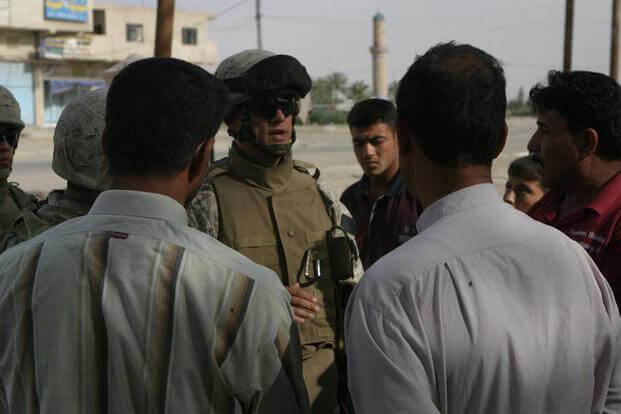The U.S. military is drawing up a list of Iraqis who have helped U.S. forces to avoid having them caught up in the red tape of President Donald Trump's restrictions on entry to the U.S., the Pentagon said Monday.
"We have been provided the opportunity by the White House to submit names," said Navy Capt. Jeff Davis, a Pentagon spokesman, for possible exemptions from the 90-day travel ban against those from Iraq, Libya, Syria, Sudan, Somalia, Yemen and Iran.
Davis also said the Defense Department is considering drawing up a separate list of non-citizen, active-duty members of the military holding green cards for distribution to other agencies to ease their entry into the U.S. from overseas.
About 5,000 non-citizens enlist in the military annually, and the average number of non-citizens serving in the total force each year is about 18,000, Davis said. The DoD had no immediate count of the number of active-duty non-citizens who are from the seven countries affected by the travel ban.
RELATED: Veterans in Congress Call for Ban Exemptions for Iraqi Interpreters
As for the Iraqis, Davis said, "We are ensuring that those who have demonstrated their commitment tangibly to fight alongside us and support us -- that those names are known in whatever process there is going forward.
"There are a number of people in Iraq who have worked for us in a partnership role, whether fighting alongside us or working as translators, often doing so at great peril to themselves," he said.
Several Iraqis who worked for the U.S. as translators on the front lines and in other capacities were caught up in the initial chaos of the travel ban over the weekend, which led to confusion among immigration officials and demonstrations at airports.
Trump issued an executive order last Friday titled, "Protecting the Nation from Foreign Terrorist Entry into the United States." In addition to the travel ban against the seven Muslim countries for at least 90 days, the order also suspended the admission into the U.S. for at least 120 days of all refugees across the globe and put an indefinite suspension on the admission of any refugees from Syria.
At least four federal judges nationwide have issued stays on implementation of the executive order on actions brought by the American Civil Liberties Union and others. New Attorney General Jeff Sessions is expected to challenge the stays in cases that could go to the Supreme Court.
Senate and House Democrats have said they will propose legislation to override the executive order, and several congressional Republicans have also voiced their concerns.
In a joint statement Sunday, Sens. John McCain, an Arizona Republican and chairman of the Senate Armed Services Committee, and Lindsey Graham, a South Carolina Republican and member of the committee, said Trump's order sent the wrong signal in the fight against the Islamic State of Iraq and Syria.
"Our most important allies in the fight against [ISIS] are the vast majority of Muslims who reject its apocalyptic ideology of hatred," they said. "This executive order sends a signal, intended or not, that America does not want Muslims coming into our country. That is why we fear this executive order may do more to help terrorist recruitment than improve our security."
In a barrage of Tweets, Trump defended his order: "Our country needs strong borders and extreme vetting, NOW. Look what is happening all over Europe and, indeed, the world -- a horrible mess!"
Another Trump Tweet mocked McCain and Graham, who both opposed his candidacy: "The two Senators should focus their energies on ISIS, illegal immigration and border security instead of always looking to start World War III."
-- Richard Sisk can be reached at Richard.Sisk@Military.com.





























